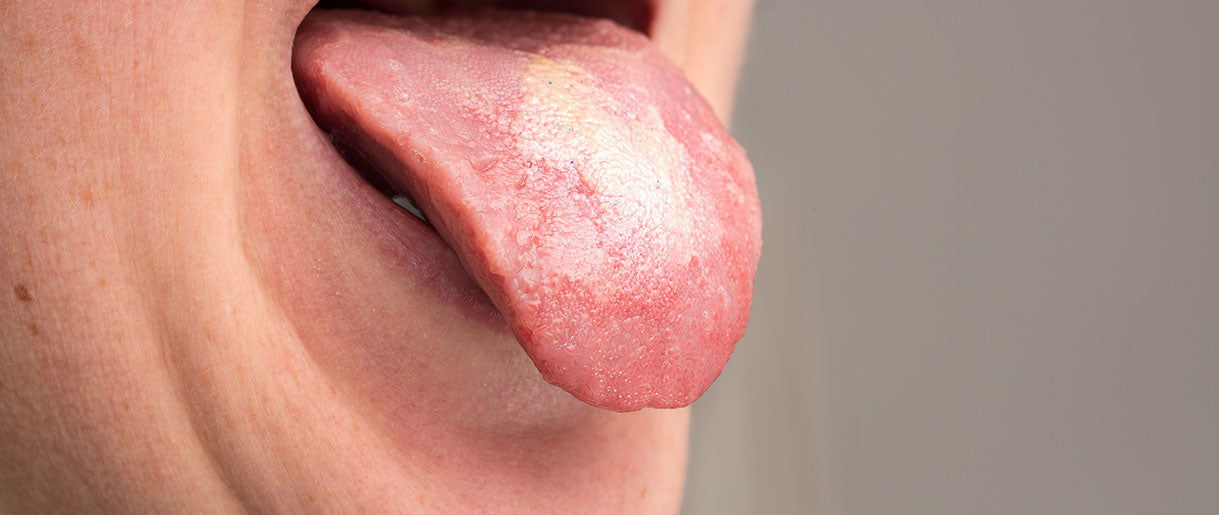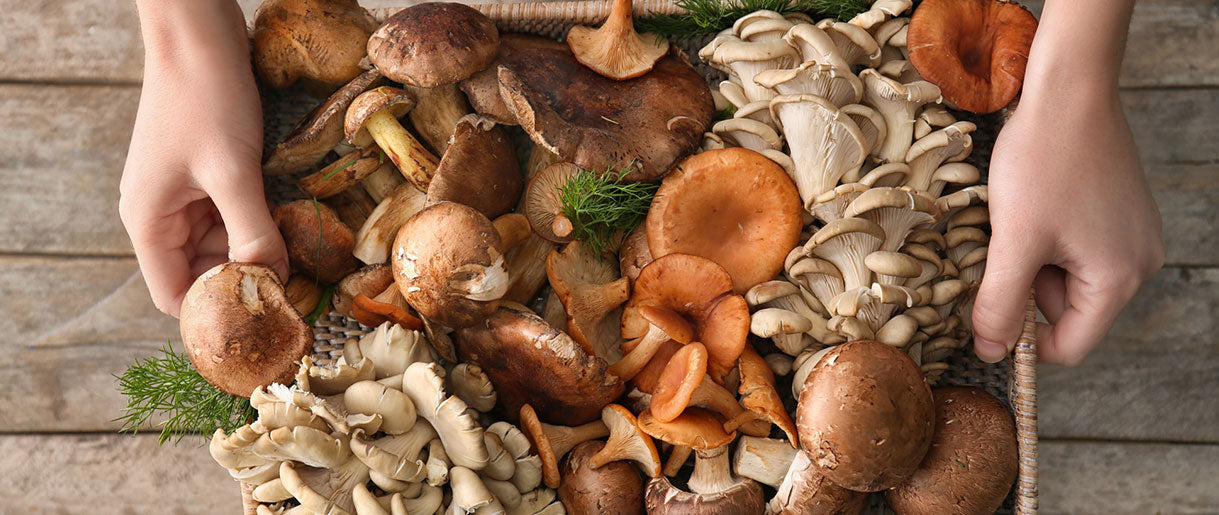In the shadow of the staggering statistic that nearly 1 in 6 deaths globally is due to cancer, there emerges a beacon of hope, and it's as natural as it gets. Amidst stories of survival and loss, there is an ongoing conversation about complementary allies in the fight against cancer, found in the very heart of nature: mushrooms.
Not just any mushrooms, though. We're talking about a select group with properties studied for their potential cancer-fighting benefits.
The Turkey Tail, Chaga, Reishi, Shiitake, and Maitake mushrooms aren't new to the wellness world; they have been historical cornerstones in traditional medicine. Today, they're capturing the scientific community's attention, leading the pack with promising research data backing their value in supporting cancer treatments.
In this revealing exploration, we spotlight these five mushrooms, diving deep into their traditional legacies, unfolding scientific insights, and their potential role in a cancer-fighting diet.
Join us as we traverse ancient forests of wisdom and modern corridors of research, unearthing some of nature's most intriguing contributions to holistic health practices.
The Fascinating Link Between Mushrooms and Cancer Care

Ancient Remedies in Modern Times
Medicinal mushrooms are not a modern fad but have deep roots in traditional Chinese medicine, offering potential support for cancer patients—ranging from those diagnosed with breast cancer to warriors battling lung cancer.
Nature's Potential Weapon Against Cancer Cells
Research (1) has illuminated how certain mushrooms can influence the progression of cancer cells, particularly breast cancer cells and lung cancer cells.
They're not an elixir for curing the disease, but scientists (2) are tapping into their potential to complement standard treatments, especially in cancer prevention and care.
It's the unique blend of bioactive compounds, like polysaccharides, specifically beta-glucans, that interact with the immune system and possibly meddle with cancer cells' nefarious activities.
The Best Mushrooms for Different Types of Cancer
But what are the best mushrooms for breast cancer or lung cancer? The list is intriguing. Certain mushrooms stand out for their potential anti-cancer properties, becoming subjects of interest in the fight against cancer.
These include the varieties often cited as the best mushrooms for prostate cancer and colorectal cancer, given their purported ability to modulate the immune response and perhaps even directly inhibit cancer cells.
A Complementary Approach, Not a Cure
However, it's crucial to acknowledge that while these mushrooms offer hope, they are not standalone treatments to treat cancer. Their role?
Think of them as supportive friends, part of a broader, doctor-approved care regimen, offering a buffer of support for cancer patients in their healthcare journey.
Integrating Mushrooms with Traditional Cancer Treatment

So, as we explore the connection between these natural wonders and their place in cancer care, remember: the goal isn't to replace conventional medicine but to potentially enhance it.
Whether it's boosting the immune system of lung cancer patients or exploring the best mushrooms for breast cancer and prostate cancer, the journey delves deep into nature's potential in providing care that's as holistic as it is hopeful.
Top 5 Mushrooms with Incredible Cancer-Fighting Potential
In the realm of natural health, medicinal mushrooms have carved a niche for themselves, especially in cancer prevention and as a supportive hand in cancer treatment.
Here, we spotlight five mushrooms that have fascinated both traditional healers and modern scientists alike. Let's unravel how these fungi make waves in complementary and alternative therapies, offering hope to cancer patients worldwide.
1. Turkey Tail: The Multicolored Maverick
Long celebrated in traditional Chinese medicine, Turkey Tail (Trametes versicolor) is as beautiful as it is potent.
Recent studies highlight (3) its potential to boost immune function—a vital asset for patients undergoing cancer therapy.
In particular, turkey tail mushrooms have shown promise(4) against breast cancer cells and as an adjuvant therapy in lung cancer treatment post-radiation therapy.
Anecdotal tales narrate stories of improved vitality among cancer patients—this suggests the benefits of turkey tail mushrooms are true.
Moreover, the potential of turkey tails to fight cancer makes them one of the best mushrooms for cancer support.
2. Chaga: The Diamond of the Forest

Chaga (Inonotus obliquus), often found on birch trees in cold climates, has sparked interest with its potential anti-cancer effects. Research suggests (5) it could slow cancer cells growth, particularly in lung and gastric cancer cases.
While its medicinal history is rich, the personal stories of those taking medicinal mushrooms like Chaga—feeling stronger during their exhaustive fights—truly warm the heart. These stories highlight the benefits of Chaga for cancer treatment.
3. Reishi: The Mushroom of Immortality

Reishi mushrooms (Ganoderma lucidum), revered in Asian culture, are studied (6) for their potential to regulate the immune system, possibly aiding cancer treatment.
From liver cancer to influencing colorectal cancer cells, Ganoderma lucidum carries constituents that may disrupt cancer progression(7). While research is ongoing, the currently available studies suggest that using Reishi for cancer may offer numerous benefits.
4. Shiitake: The Culinary Delight with a Medical Twist

Shiitake (Lentinula edodes) is not just a tasty ingredient; its potential medicinal benefits are under the microscope, too.
Compounds within these mushrooms are on the research radar (8) for possibly inhibiting cancer cells, especially in breast cancer prevention and combating colon cancer cells.
While research is inconclusive, current results indicate positive results when patients use Shiitake to fight cancer.
5. Maitake: The Dancing Mushroom

Maitake (Grifola frondose) may potentially sway more than just taste buds. The benefits of maitake mushrooms are numerous, with recent research suggesting it could aid cancer treatment.
This mushroom has caught the scientific world's attention (9) for possibly stimulating an immune response and is being considered in cancer prevention strategies, particularly against breast cancer cells and gastric cancer.
A Natural Adjunct to Cancer Care

While these mushrooms offer a beacon of hope with their historical roots and emerging scientific backing, they are not miracle cures. Instead,they stand as potential supportive allies in the arduous journey of cancer patients.
Whether you're considering taking medicinal mushrooms or curious about their role in health, it's clear that these natural specimens might be a valuable addition to traditional cancer treatment methods.
Integrating Medicinal Mushrooms into Your Wellness Journey

Embarking on a health journey, especially when confronting conditions like cancer, requires courage and diversified strategies.
Medicinal mushrooms, celebrated for centuries, are now under the scientific microscope, credited with fascinating benefits like cell cycle arrest in cancer cell lines and relief from tumor-related symptoms.
But how do we seamlessly integrate these natural powerhouses into our daily lives for optimal wellness?
Practical Inclusion Tips
From soups, mushroom teas, and even supplements, including mushroom extracts in your routine is simpler than it might appear. Whether the Reishi mushroom tea with its anti-inflammatory effects or the humble turkey tail mushroom, they can be gentle, yet potent, additions to your wellness regimen.
Cooking with Mushrooms
Enhance your meals by adding finely chopped medicinal mushrooms or using them as key ingredients in broths or sauces. Not only do they provide a savory kick, but they also pack a punch in terms of health benefits.
Supplementation
For a more concentrated intake, mushroom extracts in the form of capsules, powders, or tinctures are available. These extracts often target specific health outcomes, including managing tumor growth or ovarian cancer cells.
Quality Matters
Not all mushrooms in the market are created equal. Ensuring you obtain these from organic, trusted sources is paramount.
High-quality, reputable suppliers guarantee that you consume mushrooms free from contaminants and with the most potent therapeutic potential. Remember, purity equals efficacy.
A Balanced Approach

While medicinal mushrooms offer a range of benefits, from possibly inducing cell cycle arrest in aggressive cancer cell types to mitigating bone marrow suppression, they are not standalone miracle workers. They function best as part of a broader, balanced health strategy.
Consultation is Key
Integrating mushroom supplements or mushroom extracts should always be discussed with a healthcare provider. This step is crucial to prevent any adverse interactions with ongoing treatments, ensuring a harmonious approach to fighting cancer.
Complementary Use
These natural adjuncts may relieve tumor-related symptoms, possibly significantly reducing discomfort. Their role in bolstering immune cells is also a valuable asset for anyone undergoing strenuous cancer therapies.
Precautions, Myths, and Facts

In the realm of health and wellness, especially concerning formidable foes like cancer, myths and facts often blend, creating a confusing tapestry of information.
Medicinal mushrooms, revered for centuries and currently embraced in alternative medicine, aren't immune to this phenomenon. Let's demystify these notions, setting the record straight about their role in your health arsenal.
Debunking the "Miracle Cure" Myth
While it's true that certain mushroom species contain active compounds that can support the body's ability to fight cancer, they're not solo game-changers.
Promising cancer research points to their role as a complementary therapy, working alongside traditional treatments rather than replacing them. Understanding this can shield you against false hope and guide you toward informed choices.
Fact Check: No, mushrooms don't "cure" cancer. Yes, mushroom extract and other natural compounds have shown potential in making conventional treatment more effective and manageable.
Realistic Expectations and Informed Compliance
Aligning with medical guidance is non-negotiable. Mushrooms should supplement, not supplant, prescribed regimens. They enter the fray not as a magic bullet but as part of a holistic approach to wellness, possibly easing side effects and enhancing overall quality of life.
Safety First: Allergies, Adverse Reactions, and Responsible Consumption
Not all mushrooms are friends to everyone. Allergic reactions, though rare, happen.
Side effects can also occur, particularly when mushrooms are consumed in large quantities or in extract form. A health professional can help you navigate mushroom consumption safely, eliminating the risk of side effects.
Know Your Body
Before incorporating any mushroom extract or supplement into your regimen, a full-fledged discussion with your doctor should help you preemptively address potential allergies or interactions.
Quality Over Quantity
High doses don't equate to quicker or more potent results. Responsible consumption is critical, underscoring the need for adherence to recommended dosages and procurement from reliable sources.
Mushrooms For Cancer Video
FAQs About the Best Mushrooms for Cancer
Can Eating Mushrooms Daily Reduce My Risk Of Cancer?
While incorporating mushrooms into your daily diet can contribute to a healthy lifestyle, it's not a standalone insurance policy against cancer.
Mushrooms, especially varieties like Shiitake, Reishi, and Turkey Tail, contain bioactive compounds that have shown potential to boost immunity and may have anti-cancer properties.
However, their consumption should be considered part of a broader, balanced diet rich in fruits, vegetables, and other whole foods that collectively contribute to cancer prevention.
Always consider dietary choices as one part of a comprehensive approach to cancer risk reduction, including regular medical check-ups and lifestyle factors such as exercise and avoiding smoking.
Are There Any Clinical Trials On Mushrooms As A Cancer Treatment?
Yes, several clinical trials have explored the role of medicinal mushrooms in cancer treatment, primarily focusing on their use as an adjunct therapy to more traditional treatments.
For instance, Turkey Tail mushrooms have been studied (10) for their effects on cancer patients, particularly in improving immune response after chemotherapy.
However, while these studies are promising, they are often preliminary, and more extensive clinical trials are necessary to conclusively determine the efficacy and safety of mushrooms as complementary cancer therapy.
How Can I Consume Medicinal Mushrooms, And Are There Any Risks Involved?
Medicinal mushrooms can be consumed in various forms, including fresh, dried, powdered, or as extracts (such as tinctures or supplements). However, sourcing these products from reputable suppliers is crucial to ensure their quality and safety, as contamination with harmful substances can occur.
Furthermore, individuals considering medicinal mushrooms as part of their wellness routine should consult a healthcare provider to discuss potential risks and interactions, especially for those undergoing cancer treatments or taking prescribed medications.
While generally safe, medicinal mushrooms can cause side effects or interact with medication, underscoring the need for professional guidance.
Key Takeaways
As we've explored, medicinal mushrooms open a realm of promising possibilities, particularly in supporting cancer care.
From the immune-boosting prowess of Turkey Tail to the life-giving legends surrounding Reishi, these natural wonders present a frontier yet to be fully embraced by modern medicine.
Though not magic bullets, they represent a growing interest in understanding how natural elements can work in concert with traditional cancer treatments.
Navigating cancer is no solitary journey, and neither is finding supportive therapies. If this exploration into the synergistic potential of mushrooms and cancer care resonates with you, your next step is a conversation away.
Reach out to your healthcare provider to discuss how medicinal mushrooms could fit into your or your loved one's holistic care plan. Knowledge, after all, is most powerful when acted upon.
But our dialogue doesn't end here. Have you integrated medicinal mushrooms into your wellness routine? Noticed any changes, subtle or significant?
Your insights and experiences are invaluable, painting a more comprehensive picture for others navigating similar paths. We invite you to share your stories in the comments below—because every shared experience lights the way on the journey to integrative health and healing.
References
- Current Uses of Mushrooms in Cancer Treatment and Their Anticancer Mechanisms, (1), https://www.ncbi.nlm.nih.gov/pmc/articles/PMC9504980/
- Recent developments in mushrooms as anti-cancer therapeutics: a review, (2), https://www.ncbi.nlm.nih.gov/pmc/articles/PMC3339609/
- The mycelium of the Trametes versicolor (Turkey tail) mushroom and its fermented substrate each show potent and complementary immune activating properties in vitro, (3), https://www.ncbi.nlm.nih.gov/pmc/articles/PMC6889544/
- Therapeutic Effects of Medicinal Mushrooms on Gastric, Breast, and Colorectal Cancer: A Scoping Review, (4), https://www.ncbi.nlm.nih.gov/pmc/articles/PMC10183216/
- Continuous intake of the Chaga mushroom (Inonotus obliquus) aqueous extract suppresses cancer progression and maintains body temperature in mice, (5), https://www.ncbi.nlm.nih.gov/pmc/articles/PMC4946216/
- Immuno-physiological effects of dietary reishi mushroom powder as a source of beta-glucan on Rohu, Labeo rohita challenged with Aeromonas veronii, (6), https://www.ncbi.nlm.nih.gov/pmc/articles/PMC10480226/
- Ganoderma lucidum (Reishi mushroom) for cancer treatment, (7), https://www.ncbi.nlm.nih.gov/pmc/articles/PMC6353236/
- Combining the Anticancer and Immunomodulatory Effects of Astragalus and Shiitake as an Integrated Therapeutic Approach, (8), https://www.ncbi.nlm.nih.gov/pmc/articles/PMC8401741/
- Maitake Pro4X has anti‐cancer activity and prevents oncogenesis in BALBc mice, (9), https://www.ncbi.nlm.nih.gov/pmc/articles/PMC5055164/
- Phase 1 Clinical Trial of Trametes versicolor in Women with Breast Cancer, (10), https://www.hindawi.com/journals/isrn/2012/251632/










Let Us Know Your Comments
1 Response
Shankari | December 12, 2022
Thanks for comprehensive info on mushrooms.
When using in nutritional meals, how are they prepared?
Served? Eaten raw? Steamed? ????